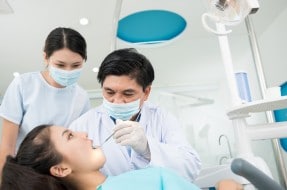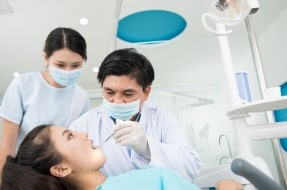Call now on0800 051 8069
Early detection and treatment of oral cancer is proven to improve long term survival rates.
More than 6,500 new cases a year are diagnosed in the UK, and one person dies every five hours from the disease. In fact, more people die from mouth cancer than from cervical and testicular cancer combined.
According to Cancer Research UK, around 90% of oral cancer cases are Squamous Cell Carcinoma (SCC); oral SCC is one of the ten most common cancers worldwide with mortality rates at 50%.
Despite oral cancer being predominantly found in older patients, there is an increasing prevalence of oral cancer in younger patients, especially in the 40-49 age group.
How can undiagnosed oral cancer be a result of negligence?
All dentists have a responsibility to screen for potentially serious conditions in the mouth, including cancer. It is established good practice for all dentists to screen their patients’ oral tissues every time they attend, whatever treatment is being carried out.
The dentist must then record the findings, whether negative or positive, and arrange an urgent referral if something suspicious is found. All that is needed for screening is a dental light and a dental mirror.
Early detection and referral to an oral cancer specialist will improve not only the patient’s chances of long-term survival but also reduce the need for disfiguring and difficult surgery and even the need for harmful radiotherapy and chemotherapy.
If you have raised any of the following symptoms and they haven’t been checked in this way, or you haven’t been promptly referred to a specialist, you may have a claim for negligence.
Common warning signs and symptoms of oral cancer are:-
- persistent ulcer
- unexplained lumps and swellings
- altered sensation e.g. numb cheek
- colour changes to the oral soft tissues – red or white discolouration
- facial palsy
- unexplained pain in the mouth or neck
- unexplained loose teeth
- double vision
- blocked nose or bleeding from the nose
- difficulty chewing or swallowing
What can I claim as a result of undiagnosed mouth cancer?
As mentioned, delays by a dentist to detect oral cancer, or to refer a patient to a specialist, may result in a patient having a successful claim for compensation.
This compensation is split into two different areas:
- general damages – this will be for any pain and suffering that you have endured as a result of your mouth cancer remaining undetected. The amount you receive is determined by legal guidelines and decided on by the court
- special damages – you can seek damages for any unnecessary financial losses as a result of the missed mouth cancer. For example, if radical jawbone resection or multiple loss of teeth with replacement by implants was required, such a claim may have a high value (in excess of £100,000).
Can you claim on behalf of a loved one, who has since passed away?
If a loved one has passed away, a claim can be brought on behalf of their estate against the dentist or treating practitioner.
Who can bring a claim on their behalf depends on whether there is a will in place; however one of our team can provide you with guidance in this respect.
The Dental Negligence Team were established over 30 years ago and have a solid track record of bringing successful claims for dental negligence. You can rest assured you are in safe hands, with experienced AvMA accredited solicitors who will fight on your behalf with compassion and sensitivity.
If you think you might have a claim for negligence as a result of undiagnosed – or misdiagnosed – mouth cancer, contact us today to find out more about making a claim for compensation.










